The Jewish
Community
of
La
Book Pages 111 - 115
Translated by: Janet Weis
KARL NEIDLINGER
Marco Bergmann, born in Laupheim on August 10, 1878, died on July 7, 1952 in Ulm, OO Elsa Jenny Bergmann née Oppenheim, born on March 3, 1886, deceased on February 2, 1956, in Frankfurt/Main.
– Eleonore “Lore” Bergmann, born in Laupheim on May 13, 1907.
– Paul Bergmann, born in Laupheim on June 6, 1910, deceased in December, 1982.
– Ruth Friga Bergmann, born in Munich on September 23, 1917, deceased on February 31, 2003.
The family emigrated to England between 1933 and 1937, later to either the USA or Canada.
“Villa Bergmann” is the original and actually the correct term for this striking building in the Ulmer Strasse, today called the “Gregorianum” or simply known as the School of Music. Marco, Anton Bergmann’s eldest son, had this prestigious building constructed, in the centre of an extensive park, in 1912 as a home for his family. This was a clear sign of prosperity before the First World War. His younger brothers and cousins didn’t build or live in such lavish homes, which certainly points out that, in the years preceding the First World War, the zenith had been reached in the history of the Bergmann business.
During Marco’s schooldays the business was still in its infancy. There was not enough money to provide for a lengthy education for the children and so, after four years at grammar school he already began his professional training. For him that meant the same as for all members of the Bergmann family: travelling, learning foreign languages and discovering the world. Marco’s years of training took him to France, to Geneva and also to the former Austro-Hungarian monarchy.
In 1904, together with his cousin Theodor, he joined the company’s management and in 1907 both were promoted to shareholders with equal rights. A precondition for this was his wedding a year before. The marriage ceremony took place in Franfurt/Main, as his wife Elsa Oppenheim originated from a long-standing Jewish upper class family in Frankfurt.
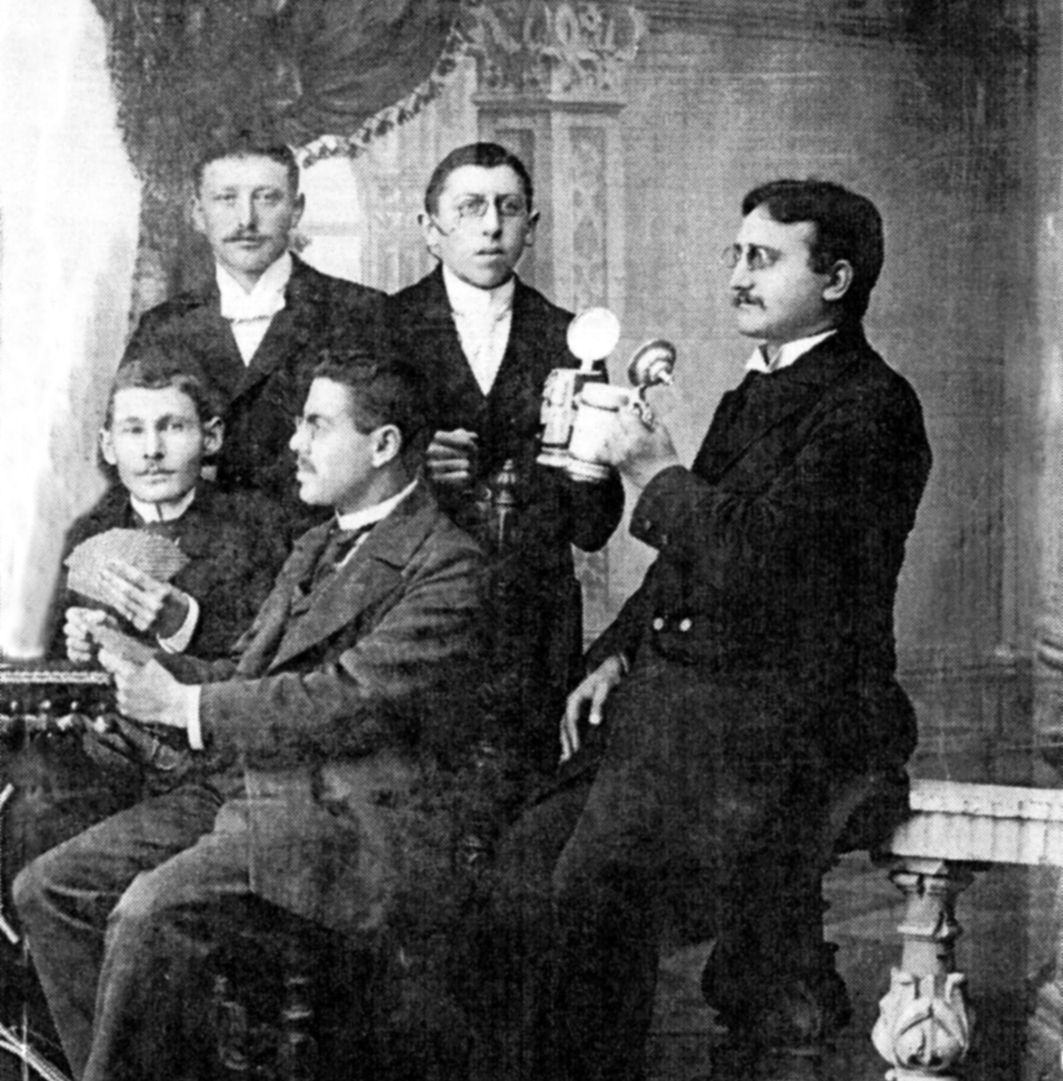
A detail from a group photograph from around 1900:
Marco (to the right) drinking a toast with Ludwig Stern,
in front sits his cousin Theodor Bergmann
As the first member of the family, and for a long time the only one, Marco possessed a driving licence and when, in 1908, he purchased a dark blue Opel, this was one of the first cars in Laupheim. The maiden journey from Ulm to Laupheim however didn’t run as smoothly as expected. The petrol tank hadn’t been filled with the correct mixture and in Dellmensingen the new car packed up. No-one knew what to do. Fortunately a horse-drawn artillery unit was passing by and Marco happened to know their officer. He lent him two horses which were harnessed to the front of the car and so arrived home pulled by 2hp.
John Bergmann characterizes Marco as a generous, musically gifted, artistic and a culturally versatile personality. Marco played the violin and in the 1920s attempted successfully to assemble an orchestra in Laupheim, which then once gave a concert with the local brass band. In addition he tried to engage non-local orchestras and theatrical groups for performances in Laupheim: that his house now accommodates the municipal music school is probably just as he would have wished.
The eldest daughter Eleonore, called Lore, was born in 1907. After leaving
school she studied medicine. Paul, born in 1910, joined his parents’ company
and, as the only member of the next generation, remained permanently loyal
to the hair business. The youngest daughter, Ruth Friga, born in 1917, was
still a schoolchild in 1933 and therefore was not able to begin any training
in Germany.
In the First World War Marco was also conscripted for military service,
first in the infantry, and afterwards, thanks to his driving licence, served
as a driver in a military unit with motor vehicles. He survived the war
unwounded.
After the war, with the founding of the Weimar Republic, women, too, in
Germany were granted active and passive electoral rights, and Elsa Bergmann
stood for the Laupheim town council as a candidate on the Women’s List which
she herself had helped to initiate. She achieved the best result on her list
with 809 votes, however failed by a narrow margin to win a seat as the first
woman in the town parliament. In this first municipal election after the war
it was Max Bergmann who won the handsome number of 2,867 votes.
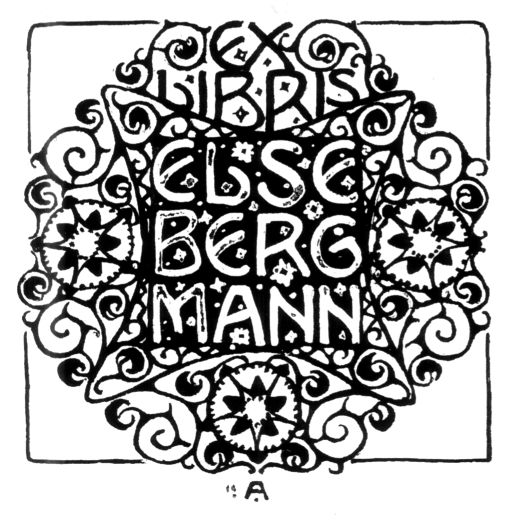
Ex libris for Else Bergmann from
Friedrich
Adler.
A small but convincing experience in connection with the Weimar period is worth mentioning here. In 1929 the Laupheim Football Club, FV Olympia, celebrated an anniversary: 25 years of football in the town were celebrated for three days. As is customary on such events, awards were granted generously, in this case silver club pins. Among those honoured were Marco and Max Bergmann, also executive committee members Mut Steiner and Sam Steiner. They were in the same club, received the same awards and possibly got on quite well with people like Abdon Lemmle, the first leader of the NS local branch, or Josef Spleis, Otto Miller, Willy Troescher or Hugo Raff, who later also held NS functional posts, such as Block- or Cell Warden. All were honoured together and all probably gathered together for a photograph. Just three years later this common ground was radically destroyed.
Also Elsa Bergmann was involved in a variety of cultural activities in
the community, although in her younger years she was distinctly
antireligious. For many years she was at the head of the Israelite
Women’s Association which considered one of its main duties “to organize
impressive religious festivals for the schoolchildren”. Her successor in
this office was Lina Kaufmann. From 1928 to 1934 Elsa Bergmann was also
at the head of the Jewish Women’s Association in Württemberg. Since the
foundation of “the National Representative Agency of German Jews” she
was one of three women in this organization. In 1934 this Agency had to
be established as umbrella organization for German Jews and contact with
the Nazi government. Elsa Bergmann attended the first assembly of this
organization on February 11, 1934 in Berlin, among such eminent persons
as Rabbi Leo Baeck, Martin Buber and other Jewish intellectuals,
altogether 52 people. Up to her emigration she worked in this
organization.
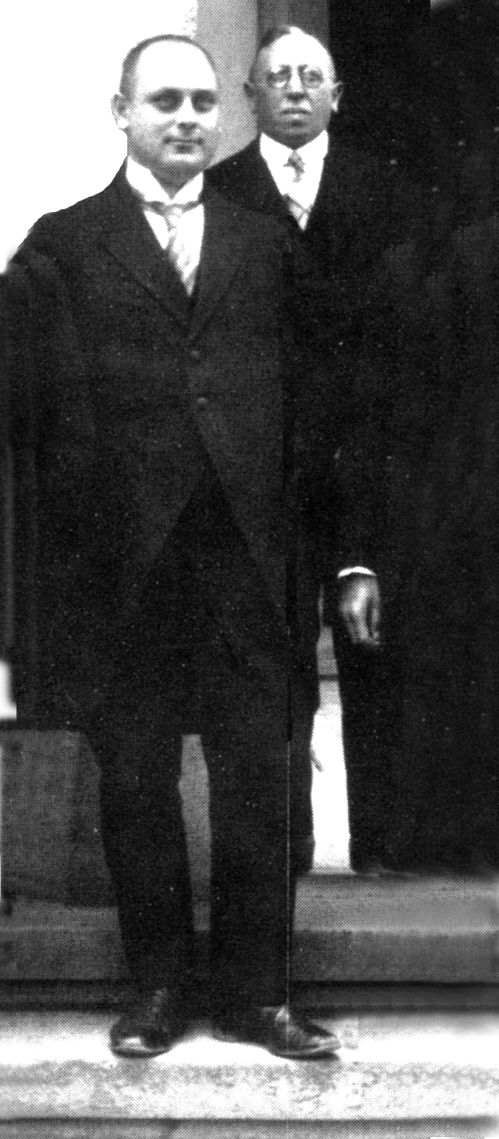
Marco Bergmann (to the right),
Standing in front, town councillor Adolf Scheffold
The eldest daughter Lore was probably the first woman in Laupheim to leave
Germany in 1933 for political reasons. She had passed her intermediate exams
for medical students at the University of Freiburg and finished her medical
studies in 1933 in Munich qualifying as a Doctor of Medicine. And now she
went to London to be able to practise her profession there.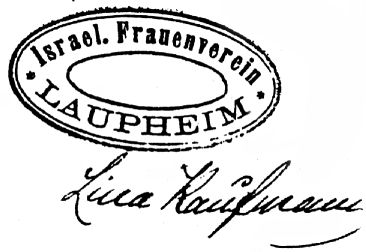
In 1933 her younger sister Ruth was still doing her secondary school leaving
certificate at the secondary school in Laupheim. On the photograph of her
class she is sitting at the very right, appearing more mature and older than
her schoolfriends. The names of her fellow pupils from the left, standing:
Anton Schick, Eugen Sonntag, Ludwig Dobler, Bruno Denser, Hermann Zepf,
Schneider (Schwendi), Fritz Staub, Karl Baum.
Sitting: Irene Traub, Liesl Hofheimer, Karl Mueller, Irene Adler, Ruth
Bergmann.
In 1936 Ruth followed her elder sister to London. Later Lore went to Canada,
Ruth to New York.
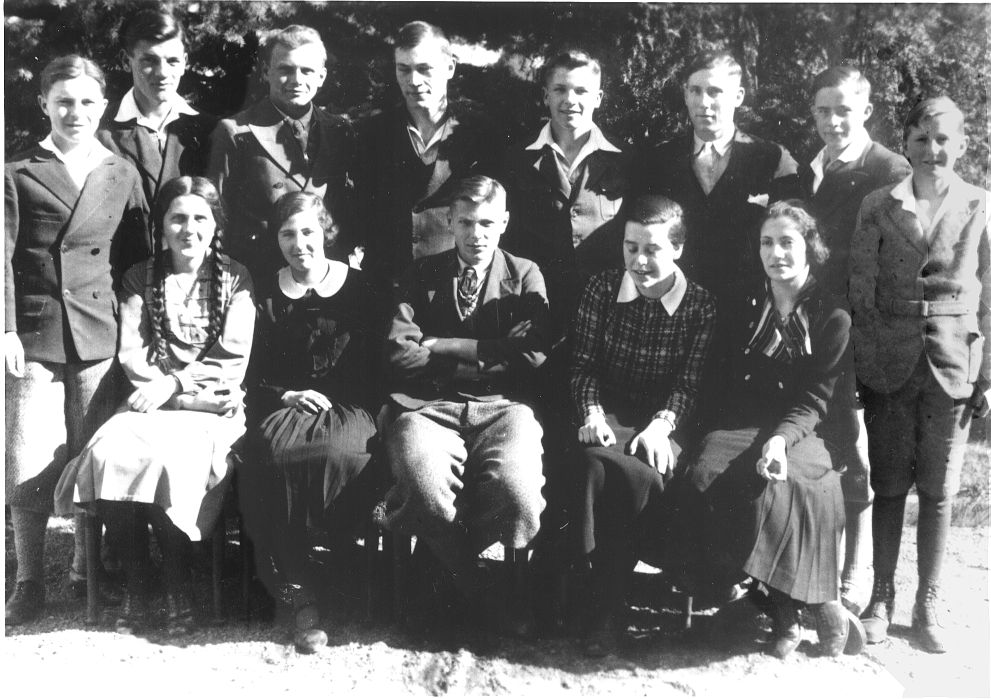
The political overview and the experiences which Elsa had been able to collect in the conversations and negotiations at the Agency with Nazi representatives certainly played a significant part in the family’s decision to flee from Germany instead of planning a normal emigration. They left almost all their belongings behind, as Marco, Elsa and Paul Bergmann managed to reach London, alternatively the USA via Havana, without entry documents, and with only a few suitcases and with a valuable Stradivari violin in the luggage. The possessions left behind were later confiscated by the German authorities.
Marco, who already in Laupheim had partly gone his own way in business, now founded his own hair processing business, into which also his son Paul entered, after returning from the war as a US soldier. This business was running well and there, after their arrival in New York, his cousins and former partners Max and Edwin temporally found work and support. As none of the children entered the hair business it was practically predetermined how the restitution proceedings in Laupheim would continue. Marco Bergmann’s family with the shareholders Marco, Elsa, Paul and Eleonore took over sole management, the heirs of the former shareholders were given a pay-off in 1950. In 1954 a further partner, Heinz Freund, joined them.
The whole complicated and burdensome restitution negotiations after the war
lay mainly in the hands of the over seventy-year-old Marco Bergmann, as well
as the resumption of production and the conduct of business. Therefore,
already after the end of the war, he was much more often in Laupheim than in
New York, where his son Paul gradually took over the management. However, up
to 1953, the Laupheim company bore the name “Württemberg Hair Factory”.
Marco never lived to see it receive the name “Bergmann” once more:
The 73 year-old Marco Bergmann was involved in a tragic traffic accident
during the journey from Ulm to Laupheim, near Dellmensingen, on June 22,
1952 and was taken to hospital with severe injuries. Here he died a day
later. His cousin Max, who put the obituary, pictured below, in the
“Schwäbische Zeitung”, survived him by six weeks.
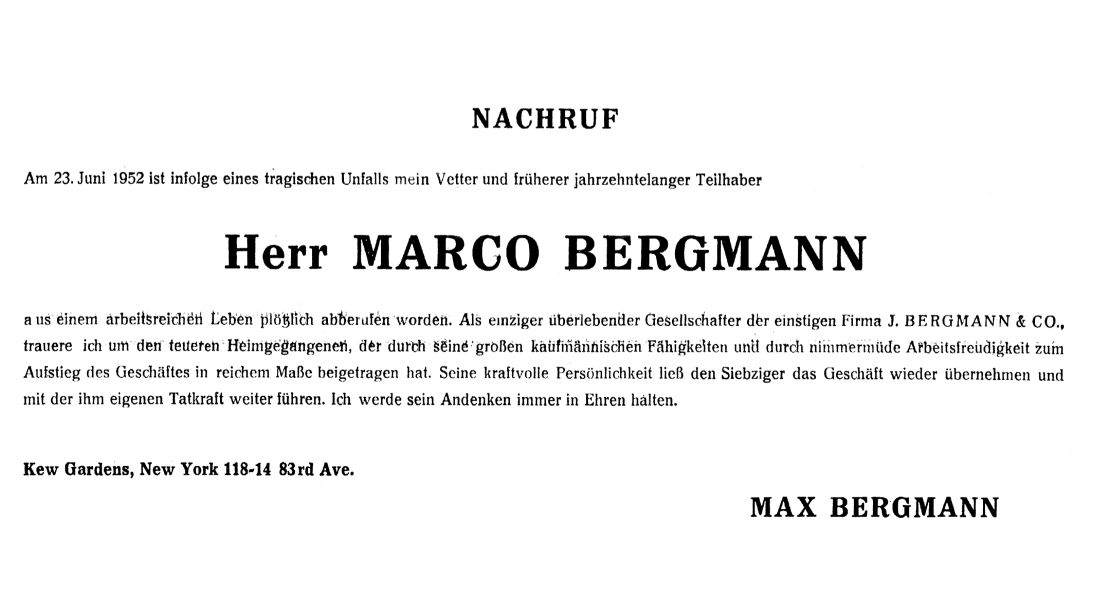
|
Obituary
On June 23, 1952, as a result of tragic accident, my cousin and
former partner for decades
HERR MARCO BERGMANN
was suddenly called away from a busy life. As the only surviving
partner of the former business J. Bergmann & Co, I mourn the death
of a dear deceased, who through his great commercial abilities and
never tiring pleasure in work contributed generously to the
advancement of the business. His powerful personality allowed the 70
year-old to take on the business once more and to continue
energetically. I shall always honour his memory.
Kew Gardens, New York 118 – 14 83rd Ave.
Max Bergmann
|
Marco’s son Paul died at the age of 72 in December 1982 in New York. Since
then his sons Peter and Ronald are joint owners of the New York as well as
the Laupheim company.
Sources
John Bergmann, The Bergmanns from Laupheim, 1983, museum inventory,
unnumbered.
Archives Theo Miller
John Bergmann estate in the Leo-Baeck Institute, New York, on micro film in
the town archives of Laupheim
17 microfiches, photograph from 2/27


